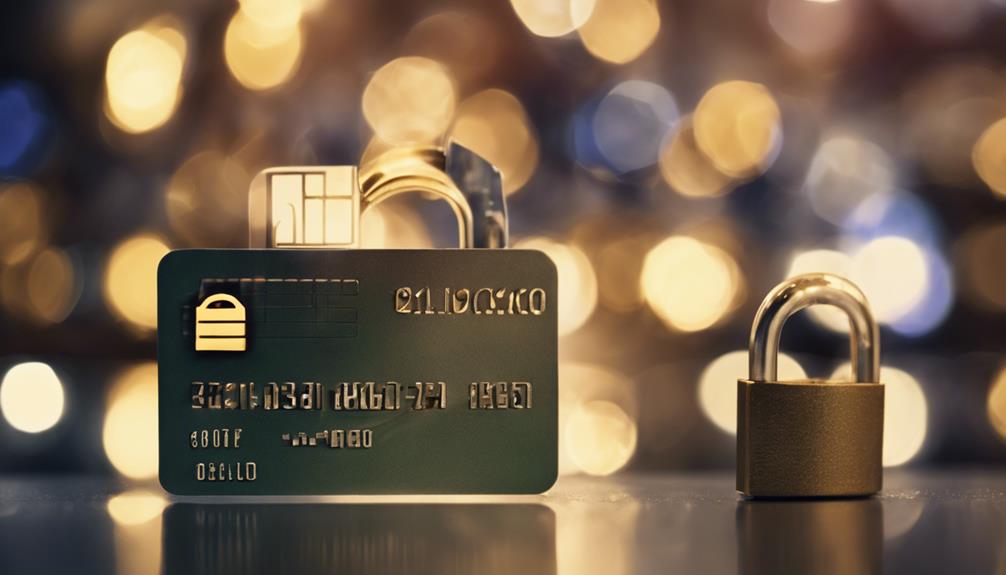To guarantee PCI compliance, you must meet 12 key requirements, including using firewalls, strong passwords, and encryption. Complying with PCI DSS shows dedication to securing cardholder data and is overseen by the PCI Security Standards Council. Following PCI guidelines is essential for protecting customer information and avoiding fines. By partnering with a PCI-compliant payment processor and conducting regular security scans, you enhance data security and customer trust. Achieving PCI compliance not only reduces the risk of breaches but also boosts brand reputation and customer confidence. Understanding these requirements is essential for safeguarding sensitive data and maintaining a secure payment environment. The power of PCI compliance lies in its ability to create a secure environment for financial transactions, assuring customers that their data is in safe hands. By following the guidelines set forth by the PCI Security Standards Council, businesses can build a reputation for trustworthiness and reliability, ultimately leading to increased customer loyalty and satisfaction. Embracing the power of PCI compliance not only protects sensitive information but also strengthens the overall security posture of an organization, positioning it as a leader in data protection and privacy. Being proactive in maintaining PCI compliance also demonstrates an organization’s commitment to staying ahead of cyber threats and constantly improving its security measures. The power of PCI compliance extends beyond just meeting the minimum requirements; it involves a continuous effort to stay vigilant and adapt to evolving security threats. Ultimately, embracing the power of PCI compliance is not just about adhering to regulations, but about prioritizing the safety and trust of your customers in an increasingly digital world.
Key Takeaways
- PCI Compliance includes 12 key requirements and 78 base requirements for data security.
- Implementing firewalls, encryption, and access restrictions is crucial for PCI DSS compliance.
- Non-compliance can result in fines, increased liability, and loss of customer trust.
- Being PCI compliant builds customer trust, enhances brand reputation, and attracts new business.
- To achieve PCI Compliance, complete SAQs yearly, pass security scans quarterly, and partner with PCI-compliant processors.
What Is PCI Compliance?

Understanding PCI Compliance is vital for businesses that handle credit card transactions to guarantee the security of customer data. This compliance standard, established by major credit card companies in 2006, encompasses 12 key requirements, 78 base requirements, and 400 test procedures. Ensuring compliance with these standards is not only essential for protecting sensitive information, but it also helps businesses build trust with their customers and avoid costly data breaches. The power of PCI compliance lies in its ability to safeguard against unauthorized access to cardholder data and prevent potential financial and reputational damage to businesses. By adhering to these strict guidelines, businesses can demonstrate their commitment to security and provide peace of mind to their customers. Moreover, maintaining PCI compliance can also help businesses avoid hefty fines and penalties imposed by credit card companies for non-compliance. The power of PCI compliance is not just about meeting the necessary standards, but also about staying ahead of potential threats and staying adaptable to evolving security measures. Ultimately, embracing the power of PCI compliance can not only protect businesses from liabilities but also position them as responsible and trustworthy entities in the eyes of their customers.
While not legally mandated, adhering to PCI standards is essential for safeguarding sensitive information and maintaining customer trust. By implementing measures such as firewalls, encryption, and access restrictions, companies can reduce the risk of data breaches and enhance their brand reputation. Furthermore, by demonstrating commitment to PCI standards, businesses can attract new customers and retain existing ones. The power of PCI compliance lies in its ability to provide customers with peace of mind, knowing that their personal information is being protected. This can ultimately lead to increased sales and loyalty from a satisfied customer base.
Compliance with PCI DSS not only protects customer data but also mitigates potential fines and liabilities associated with non-compliance. Embracing PCI guidelines is a proactive step towards ensuring the integrity and security of credit card transactions within your business.
Key Takeaways

To grasp the core insights of PCI Compliance, focus on the fundamental takeaways that businesses need to internalize for secure credit card transactions.
- Companies following PCI DSS are considered PCI compliant.
- Maintained by the PCI Security Standards Council.
- Includes firewalls, encryption, and access restrictions.
The 12 Requirements of PCI Compliance DSS

What're the essential 12 requirements for PCI Compliance DSS that businesses must adhere to for secure credit card transactions?
These requirements are important for safeguarding sensitive customer data. To begin with, add firewalls to protect data. Utilize strong password protection to enhance security. Encrypt transmitted cardholder data to prevent unauthorized access. Regularly update antivirus software to mitigate vulnerabilities. Ensure systems are tested for vulnerabilities consistently.
These steps are fundamental in maintaining PCI DSS compliance and fostering trust with customers. By following these requirements diligently, businesses can greatly reduce the risk of data breaches and uphold the integrity of their brand.
Importance for Business

Embrace the significance of PCI Compliance for your business by safeguarding sensitive customer data and ensuring secure transactions.
- Legal Requirement: PCI Compliance isn't legally mandated, but it's an essential requirement for all businesses processing credit cards.
- Avoid Penalties: Non-compliance can lead to fines and increased liability, impacting your business's financial health.
- Customer Trust: Being PCI compliant builds trust with customers and attracts new ones, showcasing your commitment to data security.
Becoming PCI Compliant

Considering the significance of safeguarding sensitive customer data and ensuring secure transactions, becoming PCI compliant is an essential step for businesses processing credit cards.
To achieve PCI compliance, you must complete a yearly Self-Assessment Questionnaire (SAQ) and pass quarterly PCI Security Scans. It's vital to partner with a payment processor offering PCI-compliant solutions to safeguard cardholder information.
By meeting these requirements, you demonstrate a commitment to data security and customer trust. Remember, PCI compliance isn't just a one-time task; it requires ongoing dedication to maintaining secure payment processing practices. Implementing powerful PCI compliance measures not only ensures the safety of customer data, but also protects your business from potential security breaches and financial liabilities. By staying up-to-date with the latest industry standards and best practices, you can continue to build a reputation as a trustworthy and reliable organization. Ultimately, investing in powerful PCI compliance is an essential step towards safeguarding both your customers and your business.
Stay proactive, prioritize security measures, and work towards a secure environment for your customers' transactions.
Consequences of Non-Compliance

Failing to comply with PCI standards can result in severe consequences for businesses processing credit card transactions. Here are three significant repercussions of non-compliance:
- Financial Penalties: Non-compliance can lead to fines, lawsuits, and even closure of your business.
- Data Breach Costs: The average cost of a data breach is estimated to be over $4 million, which can be financially devastating.
- Monthly Fees: Non-compliance may result in monthly fees reaching up to $100,000. In addition, banks might sever relationships or raise transaction fees, further impacting your business's financial stability.
Benefits for Business

Reap the benefits of PCI compliance for your business by securing transactions and safeguarding sensitive data through adherence to PCI DSS standards. By following PCI requirements, you enhance your company's security posture, reduce the risk of data breaches, and protect your customers' valuable information.
PCI compliance helps you build trust with your clientele, demonstrating your dedication to maintaining a secure environment for transactions. Additionally, being PCI compliant can save you from hefty fines associated with non-compliance, improving your financial stability.
Implementing proper security tools and partnering with a compliant payment processor not only guarantees compliance but also enhances your reputation and attracts new customers who prioritize data security. Prioritizing PCI compliance is a proactive step towards safeguarding your business and its reputation.
Frequently Asked Questions
Is PCI Compliance Required by Law?
PCI compliance isn't a legal requirement but is mandatory for businesses processing credit cards. It guarantees uniform security of customer data and was established in 2006 by major credit card companies.
Compliance involves following 12 key requirements, 78 base requirements, and 400 test procedures. Benefits include reduced data breaches and an enhanced brand reputation.
Remaining compliant involves regular assessments and security measures like firewalls and encryption to safeguard cardholder data.
How Often Should PCI Compliance Be Validated?
To validate PCI compliance, you should undergo an annual self-assessment questionnaire (SAQ) and pass a quarterly PCI security scan. It's crucial to find a payment processor with PCI-compliant solutions. By meeting these requirements, you demonstrate your dedication to safeguarding customer data.
Stay proactive to guarantee ongoing compliance and protect your business from potential fines and data breaches. Prioritize security measures to maintain trust with your customers and attract new ones.
What Are the Consequences of Failing PCI Compliance?
Failing PCI compliance can lead to severe consequences for your business. Non-compliance results in potential fines, lawsuits, and even closure.
The average cost of a data breach can exceed $4 million, with monthly fees reaching up to $100,000. Banks might increase transaction fees or terminate relationships.
To avoid these repercussions, it's essential to adhere to PCI DSS standards, implement robust security measures, and work with compliant payment processors.
By following these best practices, businesses can protect themselves and their customers from the costly and damaging effects of a data breach. The power of PCI compliance lies in its ability to provide a framework for ensuring secure payment transactions and protecting sensitive cardholder data. By partnering with payment processors that are PCI DSS compliant, businesses can ensure that they are adhering to industry regulations and best practices. This not only helps to safeguard sensitive information but also builds trust with customers and helps to maintain a strong reputation within the industry.
Can Small Businesses Benefit From PCI Compliance?
You can absolutely benefit from PCI compliance as a small business. It helps safeguard customer data, prevents breaches, and enhances your reputation.
By following the requirements, like using firewalls and encryption, you build trust with customers and attract new ones. Non-compliance can lead to fines and liability.
Stay on top of things by completing assessments, passing security scans, and working with PCI-compliant processors. It's an essential step in securing your business transactions and maintaining customer trust.
Are There Different Levels of PCI Compliance?
There are different levels of PCI compliance based on the number of transactions you process annually. These levels determine the specific requirements you need to meet to be compliant.
The levels range from Level 1 for businesses processing over 6 million transactions to Level 4 for those processing less than 20,000 transactions.
Each level has its own set of validation requirements to guarantee the security of cardholder data.
Conclusion
To sum up, embracing PCI Compliance is crucial for safeguarding your customer's data and enhancing your brand's reputation. Additionally, by ensuring PCI compliance, you are also protecting your business from potential legal and financial consequences. It shows your commitment to maintaining the highest standards of security and trust in the eyes of your customers. Partnering with a reliable provider for ultimate security solutions can further strengthen your defense against potential cyber threats and breaches.
While some may argue that the requirements can be complex and time-consuming, the benefits of increased security and customer trust far outweigh any initial challenges.
By maintaining compliance through encryption and regular assessments, you can protect your business from data breaches and attract new customers in today's digital landscape.
Embrace PCI Compliance to secure your transactions and foster customer confidence.










